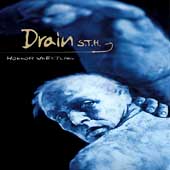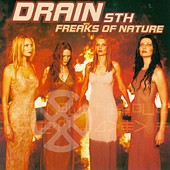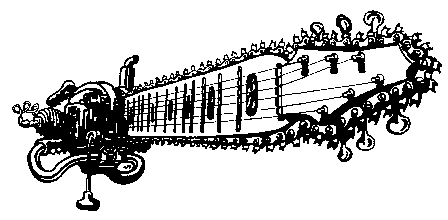


DRAIN STH -
Don't Call them Girlschool
Interview by Christopher J. Kelter - August 14, 1999
With two successful albums under their belts (click here to read our reviews) and a wildly successful tour with Black Sabbath, DRAIN STH are poised to make a very big impact on the hard rock/heavy metal world.
Rough Edge East Coast Correspondent Christopher J. Kelter caught up with the band during their stop in Maryland (click here to read Christopher's review of the show or click here to see his photos) and sat down with Anna and Martina to discuss the democracy of Drain STH, the real rock world and the sweet smell of success.
Rough Edge:
Welcome to Maryland.
Anna: Thanks.
Martina: Thank you.
Rough Edge: Were you taken by surprise at the positive
reception of "Horror Wrestling" in 1997?
 Anna: I don't know how to answer that, because when you make an
album you do it as best you can. You do what you want to do and, of course, you have this
idea that somebody else will like it. You hope for a good reception. But, no, it wasn't a
total surprise. Then again, you can't expect things to just happen. Of course, when
success happens it feels pretty good.
Anna: I don't know how to answer that, because when you make an
album you do it as best you can. You do what you want to do and, of course, you have this
idea that somebody else will like it. You hope for a good reception. But, no, it wasn't a
total surprise. Then again, you can't expect things to just happen. Of course, when
success happens it feels pretty good.
Rough Edge: So, it was good to watch "Horror
Wrestling" take off like it did?
Anna: Yes!
Rough Edge: Specifically, how about your success here in
America? Did you have high expectations for success in the States?
Martina: I would say we always had the goal to come to
America with our music. We thought that Europe was so into disco and techno dance music.
We felt like the States were the only people who were going to get our music. We did a
tour in Europe in 1996, but after that we've only spent time in America.
Rough Edge: How did you approach the recording of
"Freaks Of Nature"? Was there any pressure? Were the songs completely written
before heading into the studio?
 Martina: It was hysterical; we'd just come off a long tour - the
tour was nine months long. We did 200 shows in the States in 1997. And everyone was
telling us "the second album is so difficult to make" - it is really a time to
stay in or fall out. For the first album you get years and years to think about what you
want to do. For the second album we had no time at all. So it was pretty hysterical. And
then we had to go on tour when the record was halfway done. The instrumental parts were
pretty much recorded. We did a tour with Megadeth and Sevendust for three months. Then we
went back and had to finish writing and finish recording.
Martina: It was hysterical; we'd just come off a long tour - the
tour was nine months long. We did 200 shows in the States in 1997. And everyone was
telling us "the second album is so difficult to make" - it is really a time to
stay in or fall out. For the first album you get years and years to think about what you
want to do. For the second album we had no time at all. So it was pretty hysterical. And
then we had to go on tour when the record was halfway done. The instrumental parts were
pretty much recorded. We did a tour with Megadeth and Sevendust for three months. Then we
went back and had to finish writing and finish recording.
Rough Edge: The
band is receiving a great deal of positive press; it's exceeding even what I thought was
possible for the genre. Do you think the resurgence of melodic hard rock is going to keep
exploding?
Anna: I think a lot of people want this (melodic hard rock).
Usually a band is really really hard and heavy, but there are no vocal melodies at all -
the singer is screaming. Or it's beautiful melodies and hooks, but the music is so boring
and lame. This is what we like, what we want to do; we want to keep the heaviness and cool
riffs, but still have melodies. It seems like a lot of people kind of miss that. I think
it's going to keep growing.
Rough Edge: I certainly missed the heaviness and melodies. I
grew up listening to Def Leppard and Ratt and other bands that were somewhat heavy
and had melodies, but then that style of music disappeared in the late '80s and early
'90s.
Anna: It's very hard to take heavy riffs and melodies into
the '90s without sounding like the '80s. Certainly, the heavy riffs at that time aren't
heavy anymore.
Martina: What we
used to think of hard rock, or metal, is really just pop now. The bands you mentioned were
thought of as being so heavy and cool at the time. I used to like bands like that until
bands like Pantera came around and really sounded heavy. But, I still like the
combination. It's not easy to do; that's why people choose not to do it. The easiest thing
to do is to pick a note and scream to heavy riffs. It's pretty hard to write a melody on
top of that.
Rough Edge: Certainly, there is a growing appreciation for
that genre of music again - I think it will keep getting bigger.
Martina: I think so, too.
Rough Edge: From what I have read, Drain sth uses a
democratic approach and it seems to have served the band very well. Are there any factors
that help the band make decisions which songs get on the record or which songs get played
at shows?
Martina: We try to make everyone in the band happy. We don't
force anything on anybody.
Anna: I think we are a very democratic band; probably more
than any other band I've ever met. That's tough sometimes; "Let me do what I want to
do!" (in mock frustration). But in the long run I think we win more by being
democratic. Everybody is 25% of this band and I think that is a really good thing.
Martina: If we
didn't include everyone then those who were left out would have no reason to be in this
band - sooner or later we'd all fall apart. Everybody has different influences in music so
when it comes together that's why I think it sounds the way it does.
Rough Edge: The lyrics seem confessional, yet how much
revelation comes to you during the writing process? Is the writing process cathartic -
does even more come out during the creative process?
Martina: It's very cathartic. You never really plan what the
song is about; it's more like the song reveals itself. That's a good word -
"confessional" - it's very true.
Anna: There are a lot of people that think the lyrics are just words, but it's not. We get a good response from the lyrics, too; people are coming up to us just to let us know how much the lyrics mean to them. It seems like everybody connects themselves to a situation; everybody has experienced that themselves. Maybe it's not interpreted the same exact way it was written. I think it's cool when the lyrics helped them through hard times - that means a lot.
Rough Edge:
Strength and independence are also prevalent in the lyrics. Is the lyrical subject matter
purely autobiographical? Or do you use others' situations for subject matter?
Martina: It's totally autobiographical, except for
"Simon Says." That's the only song on the new album that has another kind
of meaning - it's about people following trends, doing anything to be accepted, to belong
to a group, "do anything that Simon says." That's the only song that sticks out
a little bit. In a way, it is about ourselves, too, because where we come from, Sweden, is
very focused on fashion. Sweden is one of the most trendy places. You have to go to the
right bars, wear the right clothes, go with the right people, even order the right drink
to be accepted or be cool. Not too many people stick out.
Rough Edge: So
there isn't much individuality in Sweden?
Anna: No, it isn't encouraged at all.
Rough Edge: How much of the music is each individual's
influences and how much of the music is the combined influences of the band?
Anna: It is
definitely a combination. In the end, everybody is very involved in the songwriting.
Particular songs you might work more with one other person while two others are working on
another song. That makes all the songs a little different, I guess. We all come from the
same kind of roots - growing up listening to the same kinds of music. But now, it
ranges from new pop and Madonna to Pantera and Massive Attack. Everything is just a big
mix, everything that everybody is listening to.
Rough Edge: It seems that Drain sth are right in the middle
of the Swedish musical extremes fitting in the middle of happy pop like Ace Of Base or
ABBA, but there is also Meshuggah and the black metal scene.
Anna: Yeah, Meshuggah are the scariest metal ever.
Martina: Usually, there is nothing in between because all the
groups like Roxette and Ace Of Base and all that kind of music is so promoted. It
gets so much help - you could sell any shit and just serve it to anybody and that's what
they're going to get. On the other hand, you have all these metal bands, totally death
metal bands, that get no help from anyone. They do everything themselves. They're on small
independent labels and they go tour in a van and they don't have any tour support. But in
the middle, there's no one. It's just us I think.
Rough Edge: The
touring experience on OzzFest in 1997 must have paid off for the band.
Anna: Yes, it did.
Martina: We worked our asses off.
Rough Edge: Was it a hard decision to play OzzFest '99?
Anna: We missed it. We really wanted to do it. It's so big in
two different ways. The first one, which is very important, is the exposure you get at
OzzFest playing in front of so many people everyday which for us is a great chance to
spread the Drain sth name. Then it's just a great tour to be on because it is so much fun
- it's like a big summer camp. Sixteen bands! Ninety-eight buses! It's like a big party,
you have so much fun, and you get to know so many cool, interesting, nice people that
become your friends forever. It's a really good tour to do - it was not a hard decision at
all.
Martina: We weren't supposed to do OzzFest '99 at all because
everything was so delayed with the album. Once we realized that, we decided to try to do
OzzFest again, but everything was booked. Every band was on - there were no more slots.
But then three other bands decided not to do it so at the last minute we got it.
Rough Edge: There
was a little luck involved?
Martina: I think Judas Priest, Buckcherry, and Nashville
Pussy - they all dropped off and left a slot open for us.
Rough Edge: A few times Drain sth opened the main stage at
this year's OzzFest - how did the band handle that experience?
Anna: We opened the main stage four times. It's so much more
expansive. And the kids aren't even in the seats - they are all far away on the grass.
It's tough to play with the fans so far away. It's tough, but it's a good experience to do
that. But it is more fun to be on the second stage - it's more intimate.
Rough Edge: How
have the American audiences changed towards Drain sth this summer?
Anna: Well, all the touring we did in '97 and '98 is starting
to pay off. People know who we are. We have a fan base and people come to the shows
knowing the songs. That didn't happen the first time around because that was the first
time we were exposed to America. In that way, it's a different experience for us.
Martina: Also, when we chose not to have any pictures on the first album, no press pictures - nobody knew who we were. I guess it wasn't the smartest thing to do. We wanted people to approach us and make up their minds without seeing pictures of us before hand.
Rough Edge: I hadn't known people were reacting that way - it was very strange for me to realize that. I always figured people would go see a band regardless of who was in it.
Anna: Well, it was
unusual for people seeing an all-girl band. People would get so surprised, jaws start
dropping, saying "wow, can this really happen?" It is weird.
Martina: When the "Horror Wrestling" album came up
we were being compared to Alice In Chains and Metallica which was just fine with us
because those are two good bands. But the minute they saw the pictures, we were being
compared to Girlschool and Doro Pesch and other old '80s metal. We certainly don't want to
be like that. We don't look like that - there's no resemblance at all. It would be like
comparing AC/DC to Rush because there are guys in the band. Comparisons can't be made like
that - it's two different things. No one ever says "the all-guy act Kiss" - it
would never happen.
Rough Edge: For a band that deliberately avoided the gender issue for the press for "Horror Wrestling," there certainly was a switch for the artwork for "Freaks Of Nature." Why the change of heart?
Anna: We always want to do the opposite, to do what people least expected us to do. From doing "Horror Wrestling" without any pictures of us to putting ourselves on the front cover in our dresses which was something nobody would expect us to do. People were expecting the black pants and black clothes. We just wanted to do something totally different. We shocked our fans, they were saying "what did they do?"
Rough Edge: I know that writing for you takes place away from the road, but at this early stage do you have any ideas what the next disc is going to bring to the Drain sth sound?
Martina: No. We didn't even know where this album was going to go. Actually, when we went on tour last year we thought we'd be able to write on tour. We assured the record company that when we got back we'd have our shit together and that we'd go right to the studio. We didn't have one riff.
Anna: We even had a portable studio in the back of the bus - nobody even touched it! Once we forced ourselves to sit down and try for five minutes to see what happened, but it didn't work.
Rough Edge: How
has the band changed over the last six years? How has the band changed from the first
rehearsal to this point?
Martina: Everything has changed even though I've never really
thought of the changes we've gone through. From being a rookie band just starting out in
our shitty rehearsal studio with shitty equipment with just a little idea that this was
what we wanted to do. So many things have happened over the years; we started touring in
'96 and since then we haven't had any time off. We really haven't had any time to think
about what has changed. We have to be focused on what has to be done.
Anna: That's what
we expected when we first started the band. We realized that there were so many other
things to be done. I just thought I'd be a bass player in a band and that was it. I had no
idea about all this business stuff.
Martina: You have no idea you have to be your own lawyer.
Anna: Yeah, I had to be my own manager, my own lawyer, my own
accountant. Taking care of everything like t-shirts and everything else that is involved
with being in a band - no one thinks of that when they are watching you play.
Martina: I had
thought I'd play drums and party.
Anna: Of course, there is a lot of partying and stuff. And I
actually am a bass player, too! But there is so much more that goes into it.
Rough Edge: Thanks for your time. I'm sure your success will continue.
Back to RoughEdge.com Features Page
Copyright © 1999 by R. Scott Bolton. All rights
reserved.
Revised: 06 Oct 2019 11:48:50 -0400.
